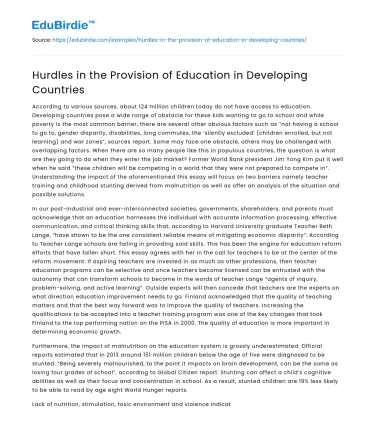According to various sources, about 124 million children today do not have access to education. Developing countries pose a wide range of obstacle for these kids wanting to go to school and while poverty is the most common barrier, there are several other obvious factors such as “not having a school to go to, gender disparity, disabilities, long commutes, the ‘silently excluded’ (children enrolled, but not learning) and war zones”, sources report. Some may face one obstacle, others may be challenged with overlapping factors. When there are so many people like this in populous countries, the question is what are they going to do when they enter the job market? Former World Bank president Jim Yong Kim put it well when he said “these children will be competing in a world that they were not prepared to compete in”. Understanding the impact of the aforementioned this essay will focus on two barriers namely teacher training and childhood stunting derived from malnutrition as well as offer an analysis of the situation and possible solutions.
In our post-industrial and ever-interconnected societies, governments, shareholders, and parents must acknowledge that an education harnesses the individual with accurate information processing, effective communication, and critical thinking skills that, according to Harvard University graduate Teacher Beth Lange, “have shown to be the one consistent reliable means of mitigating economic disparity”. According to Teacher Lange schools are failing in providing said skills. This has been the engine for education reform efforts that have fallen short. This essay agrees with her in the call for teachers to be at the center of the reform movement. If aspiring teachers are invested in as much as other professions, then teacher education programs can be selective and once teachers become licensed can be entrusted with the autonomy that can transform schools to become in the words of teacher Lange “agents of inquiry, problem-solving, and active learning”. Outside experts will then concede that teachers are the experts on what direction education improvement needs to go. Finland acknowledged that the quality of teaching matters and that the best way forward was to improve the quality of teachers. Increasing the qualifications to be accepted into a teacher training program was one of the key changes that took Finland to the top performing nation on the PISA in 2000. The quality of education is more important in determining economic growth.
Save your time!
We can take care of your essay
- Proper editing and formatting
- Free revision, title page, and bibliography
- Flexible prices and money-back guarantee
Furthermore, the impact of malnutrition on the education system is grossly underestimated. Official reports estimated that in 2013 around 151 million children below the age of five were diagnosed to be stunted. “Being severely malnourished, to the point it impacts on brain development, can be the same as losing four grades of school”, according to Global Citizen report. Stunting can affect a child’s cognitive abilities as well as their focus and concentration in school. As a result, stunted children are 19% less likely to be able to read by age eight World Hunger reports.
Lack of nutrition, stimulation, toxic environment and violence indicate a 40% less brain volume due to fewer neuronal connections. Long term studies show that these children do not learn as well and they do not earn as well. The crisis of childhood stunting is much more serious than previously thought, 155 million children in the world, India 38% childhood stunting, 38% Ethiopia, Afghanistan 41%, Pakistan 45%, Guatemala 50% according to UNICEF. The assumption is that they will find it very difficult to compete in the economy of the future.
OECD studies indicate PISA exam is directly correlated with economic growth. So, with the data available now we can postulate questions such as how important is investing in people in terms of economic growth? And while some developing countries invest more in their armed forces than in their classroom, the Changing Wealth of Nation report indicate that investing in human beings is the most important for economic growth. According to a recent OECD report, providing every child with access to education and the skills needed “to participate fully in society would boost GDP by an average 28% per year in lower-income countries”. Ensuring they are allowed to complete their education it is ‘sound economics’. Communities and countries will benefit in health, equality, and job creation. This could also influence on the cost of borrowing capitals for governments according to sources.
In conclusion, this essay argues in favor of a robust education system “underpinned by qualified, professionally trained, motivated, and well-supported teachers”. It is also the argument of this essay that proper nutrition is hugely important in determining how effective the learning outcome will be.






 Stuck on your essay?
Stuck on your essay?

